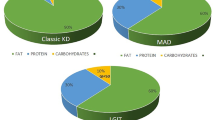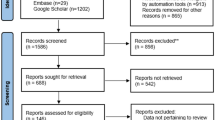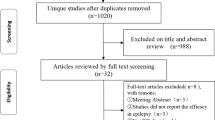Abstract
The ketogenic diet (KD), containing high levels of fat and low levels of carbohydrates, has been used to treat refractory epilepsy since the 1920s. In the past few decades, there has been more interest in less restrictive KDs such as the modified Atkins diet (MAD).
Purpose
Our aim was to review all evidence regarding the efficacy and tolerability of the KD and MAD from randomized controlled trials (RCTs) in children and adolescents with refractory epilepsy.
Methods
We reviewed the current literature using Cochrane, EMBASE, and MEDLINE (using PubMed). We implemented predefined criteria regarding dataextraction and study quality.
Results
We identified five RCTs that generated seven publications and recruited 472 children and adolescents with refractory epilepsy (≤ 18 years). The primary outcome (seizure frequency reduction (SFR) ≥ 50%) was attained in 35–56.1% of the participants in the intervention group, compared with 6–18.2% in the control group. Our meta-analysis underlined the significant efficacy of the KD compared with the control group: RR = 5.1 (95% CI 3.18–8.21, p < 0.001). Additionally, only two studies mentioned possible biomarkers to objectively evaluate the efficacy. Secondary outcomes, such as seizure severity and quality of life, were studied in three trials, leading to indecisive generalization of these findings. Gastro-intestinal adverse effects were the most prevalent, and no severe adverse effects were reported.
Conclusion
Despite the heterogeneity between all studies, the beneficial results underline that dietary interventions should be considered for children and adolescents with refractory epilepsy who are not eligible for epilepsy surgery. Future studies should be multi-center and long-term, and evaluate potential biomarkers and adverse effects.





Similar content being viewed by others
References
Singh A, Trevick S (2016) The epidemiology of global epilepsy. Neurol Clin 34:837–847. https://doi.org/10.1016/j.ncl.2016.06.015
Loscher W, Klitgaard H, Twyman RE, Schmidt D (2013) New avenues for anti-epileptic drug discovery and development. Nat Rev Drug Discov 12:757–776. https://doi.org/10.1038/nrd4126
Kwan P, Arzimanoglou A, Berg AT et al (2010) Definition of drug resistant epilepsy: consensus proposal by the ad hoc task force of the ILAE commission on therapeutic strategies. Epilepsia 51:1069–1077. https://doi.org/10.1111/j.1528-1167.2009.02397.x
Schmidt D (2009) Drug treatment of epilepsy: options and limitations. Epilepsy Behav 15:56–65. https://doi.org/10.1016/j.yebeh.2009.02.030
Ramey WL, Martirosyan NL, Lieu CM, Hasham HA, Lemole GM Jr, Weinand ME (2013) Current management and surgical outcomes of medically intractable epilepsy. Clin Neurol Neurosurg 115:2411–2418. https://doi.org/10.1016/j.clineuro.2013.09.035
Schijns OEMG, Hoogland G, Kubben PL, Koehler PJ (2015) The start and development of epilepsy surgery in Europe: a historical review. Neurosurg Rev 38:447–461. https://doi.org/10.1007/s10143-015-0641-3
Sourbron J, Klinkenberg S, Kessels A, Schelhaas HJ, Lagae L, Majoie M (2017) Vagus nerve stimulation in children: a focus on intellectual disability. Eur J Paediatr Neurol 21:427–440. https://doi.org/10.1016/j.ejpn.2017.01.011
Martin K, Jackson CF, Levy RG, Cooper PN (2016) Ketogenic diet and other dietary treatments for epilepsy. Cochrane Database Syst Rev 2:CD001903. https://doi.org/10.1002/14651858.CD001903.pub3
Seo JH, Lee YM, Lee JS, Kang HC, Kim HD (2007) Efficacy and tolerability of the ketogenic diet according to lipid:nonlipid ratios--comparison of 3:1 with 4:1 diet. Epilepsia 48:801–805. https://doi.org/10.1111/j.1528-1167.2007.01025.x
Simeone TA, Simeone KA, Stafstrom CE, Rho JM (2018) Do ketone bodies mediate the anti-seizure effects of the ketogenic diet? Neuropharmacology 133:233–241. https://doi.org/10.1016/j.neuropharm.2018.01.011
Zhang Y, Zhou S, Zhou Y, Yu L, Zhang L, Wang Y (2018) Altered gut microbiome composition in children with refractory epilepsy after ketogenic diet. Epilepsy Res 145:163–168. https://doi.org/10.1016/j.eplepsyres.2018.06.015
Boison D (2017) New insights into the mechanisms of the ketogenic diet. Curr Opin Neurol 30:187–192. https://doi.org/10.1097/WCO.0000000000000432
Vining EP (1999) Clinical efficacy of the ketogenic diet. Epilepsy Res 37:181–190
Huttenlocher PR, Wilbourn AJ, Signore JM (1971) Medium-chain triglycerides as a therapy for intractable childhood epilepsy. Neurology 21:1097–1103
El-Rashidy OF, Nassar MF, Abdel-Hamid IA et al (2013) Modified Atkins diet vs classic ketogenic formula in intractable epilepsy. Acta Neurol Scand 128:402–408. https://doi.org/10.1111/ane.12137
Larson AM, Pfeifer HH, Thiele EA (2012) Low glycemic index treatment for epilepsy in tuberous sclerosis complex. Epilepsy Res 99:180–182. https://doi.org/10.1016/j.eplepsyres.2011.10.021
Rezaei S, Harsini S, Kavoosi M, Badv RS, Mahmoudi M (2018) Efficacy of low glycemic index treatment in epileptic patients: a systematic review. Acta Neurol Belg 118:339–349. https://doi.org/10.1007/s13760-018-0881-4
Miranda MJ, Turner Z, Magrath G (2012) Alternative diets to the classical ketogenic diet--can we be more liberal? Epilepsy Res 100:278–285. https://doi.org/10.1016/j.eplepsyres.2012.06.007
Wilmshurst JM, Gaillard WD, Vinayan KP, Tsuchida TN, Plouin P, van Bogaert P, Carrizosa J, Elia M, Craiu D, Jovic NJ, Nordli D, Hirtz D, Wong V, Glauser T, Mizrahi EM, Cross JH (2015) Summary of recommendations for the management of infantile seizures: Task Force report for the ILAE Commission of Pediatrics. Epilepsia 56:1185–1197. https://doi.org/10.1111/epi.13057
IJff DM, Postulart D, Lambrechts DAJE, Majoie MHJM, de Kinderen RJA, Hendriksen JGM, Evers SMAA, Aldenkamp AP (2016) Cognitive and behavioral impact of the ketogenic diet in children and adolescents with refractory epilepsy: a randomized controlled trial. Epilepsy Behav 60:153–157. https://doi.org/10.1016/j.yebeh.2016.04.033
Liberati A, Altman DG, Tetzlaff J, Mulrow C, Gøtzsche PC, Ioannidis JP, Clarke M, Devereaux PJ, Kleijnen J, Moher D (2009) The PRISMA statement for reporting systematic reviews and meta-analyses of studies that evaluate health care interventions: explanation and elaboration. J Clin Epidemiol 62:e1–e34. https://doi.org/10.1016/j.jclinepi.2009.06.006
Liu YC (2008) Medium-chain triglyceride (MCT) ketogenic therapy. Epilepsia 49(Suppl 8):33–36. https://doi.org/10.1111/j.1528-1167.2008.01830.x
Kossoff EH, Dorward JL (2008) The modified Atkins diet. Epilepsia 49(Suppl 8):37–41. https://doi.org/10.1111/j.1528-1167.2008.01831.x
Masino SA, Rho JM (2012) Mechanisms of ketogenic diet action. In: Noebels JL, Avoli M, Rogawski MA et al (eds) Jasper’s basic mechanisms of the epilepsies [Internet], 4th edn. National Center for Biotechnology Information (US), Bethesda
de Kinderen RJA, Lambrechts DAJE, Postulart D, Kessels AG, Hendriksen JG, Aldenkamp AP, Evers SM, Majoie MH (2011) Research into the (cost-) effectiveness of the ketogenic diet among children and adolescents with intractable epilepsy: design of a randomized controlled trial. BMC Neurol 11:10. https://doi.org/10.1186/1471-2377-11-10
Higgins JPT, Altman DG, Gotzsche PC et al (2011) The Cochrane Collaboration’s tool for assessing risk of bias in randomised trials. BMJ 343:d5928. https://doi.org/10.1136/bmj.d5928
Neal EG, Chaffe H, Schwartz RH, Lawson MS, Edwards N, Fitzsimmons G, Whitney A, Cross JH (2008) The ketogenic diet for the treatment of childhood epilepsy: a randomised controlled trial. Lancet Neurol 7:500–506. https://doi.org/10.1016/S1474-4422(08)70092-9
Sharma S, Sankhyan N, Gulati S, Agarwala A (2013) Use of the modified Atkins diet for treatment of refractory childhood epilepsy: a randomized controlled trial. Epilepsia 54:481–486. https://doi.org/10.1111/epi.12069
Sharma S, Goel S, Jain P, Agarwala A, Aneja S (2016) Evaluation of a simplified modified Atkins diet for use by parents with low levels of literacy in children with refractory epilepsy: a randomized controlled trial. Epilepsy Res 127:152–159. https://doi.org/10.1016/j.eplepsyres.2016.09.002
Wijnen BFM, de Kinderen RJA, Lambrechts DAJE, Postulart D, Aldenkamp AP, Majoie MHJM, Evers SMAA (2017) Long-term clinical outcomes and economic evaluation of the ketogenic diet versus care as usual in children and adolescents with intractable epilepsy. Epilepsy Res 132:91–99. https://doi.org/10.1016/j.eplepsyres.2017.03.002
Lambrechts DAJE, de Kinderen RJA, Vles JSH, de Louw AJ, Aldenkamp AP, Majoie HJ (2017) A randomized controlled trial of the ketogenic diet in refractory childhood epilepsy. Acta Neurol Scand 135:231–239. https://doi.org/10.1111/ane.12592
Henderson CB, Filloux FM, Alder SC, Lyon JL, Caplin DA (2006) Efficacy of the ketogenic diet as a treatment option for epilepsy: meta-analysis. J Child Neurol 21:193–198. https://doi.org/10.2310/7010.2006.00044
Zupec-Kania BA, Spellman E (2008) An overview of the ketogenic diet for pediatric epilepsy. Nutr Clin Pract 23:589–596. https://doi.org/10.1177/0884533608326138
Martin-McGill KJ, Jackson CF, Bresnahan R, Levy RG, Cooper PN (2018) Ketogenic diets for drug-resistant epilepsy. Cochrane Database Syst Rev 11:CD001903. https://doi.org/10.1002/14651858.CD001903.pub4
Levy RG, Cooper PN, Giri P, Weston J (2012) Ketogenic diet and other dietary treatments for epilepsy. Cochrane Database Syst Rev. https://doi.org/10.1002/14651858.CD001903.pub2
Levy RG, Cooper PP (2003) Ketogenic diet for epilepsy. Cochrane Database Syst Rev. https://doi.org/10.1002/14651858.CD001903
Neal EG, Chaffe H, Schwartz RH, Lawson MS, Edwards N, Fitzsimmons G, Whitney A, Cross JH (2009) A randomized trial of classical and medium-chain triglyceride ketogenic diets in the treatment of childhood epilepsy. Epilepsia 50:1109–1117. https://doi.org/10.1111/j.1528-1167.2008.01870.x
Kossoff EH, Dorward JL, Turner Z, Pyzik PL (2011) Prospective study of the modified Atkins diet in combination with a ketogenic liquid supplement during the initial month. J Child Neurol 26:147–151. https://doi.org/10.1177/0883073810375718
Rezaei S, Abdurahman AA, Saghazadeh A et al (2019) Short-term and long-term efficacy of classical ketogenic diet and modified Atkins diet in children and adolescents with epilepsy: a systematic review and meta-analysis. Nutr Neurosci 22:317–334. https://doi.org/10.1080/1028415X.2017.1387721
Pulsifer MB, Gordon JM, Brandt J, Vining EP, Freeman JM (2001) Effects of ketogenic diet on development and behavior: preliminary report of a prospective study. Dev Med Child Neurol 43:301–306
Nordli DRJ, Kuroda MM, Carroll J et al (2001) Experience with the ketogenic diet in infants. Pediatrics 108:129–133
Lambrechts DAJE, Bovens MJM, de la Parra NM, Hendriksen JG, Aldenkamp AP, Majoie MJ (2013) Ketogenic diet effects on cognition, mood, and psychosocial adjustment in children. Acta Neurol Scand 127:103–108. https://doi.org/10.1111/j.1600-0404.2012.01686.x
van Berkel AA, IJff DM, Verkuyl JM (2018) Cognitive benefits of the ketogenic diet in patients with epilepsy: a systematic overview. Epilepsy Behav 87:69–77. https://doi.org/10.1016/j.yebeh.2018.06.004
Berg AT, Altalib HH, Devinsky O (2017) Psychiatric and behavioral comorbidities in epilepsy: a critical reappraisal. Epilepsia 58:1123–1130. https://doi.org/10.1111/epi.13766
Olson CA, Vuong HE, Yano JM et al (2018) The gut microbiota mediates the anti-seizure effects of the ketogenic diet. Cell 174:497
Xie G, Zhou Q, Qiu C-Z, Dai WK, Wang HP, Li YH, Liao JX, Lu XG, Lin SF, Ye JH, Ma ZY, Wang WJ (2017) Ketogenic diet poses a significant effect on imbalanced gut microbiota in infants with refractory epilepsy. World J Gastroenterol 23:6164–6171. https://doi.org/10.3748/wjg.v23.i33.6164
Lindefeldt M, Eng A, Darban H, Bjerkner A, Zetterström CK, Allander T, Andersson B, Borenstein E, Dahlin M, Prast-Nielsen S (2019) The ketogenic diet influences taxonomic and functional composition of the gut microbiota in children with severe epilepsy. NPJ Biofilms Microbiomes 5:5. https://doi.org/10.1038/s41522-018-0073-2
Kossoff EH, Zupec-Kania BA, Auvin S, Ballaban-Gil KR, Christina Bergqvist AG, Blackford R, Buchhalter JR, Caraballo RH, Cross JH, Dahlin MG, Donner EJ, Guzel O, Jehle RS, Klepper J, Kang HC, Lambrechts DA, Liu YMC, Nathan JK, Nordli DR Jr, Pfeifer HH, Rho JM, Scheffer IE, Sharma S, Stafstrom CE, Thiele EA, Turner Z, Vaccarezza MM, van der Louw E, Veggiotti P, Wheless JW, Wirrell EC, Charlie Foundation, Matthew’s Friends, Practice Committee of the Child Neurology Society (2018) Optimal clinical management of children receiving dietary therapies for epilepsy: updated recommendations of the International Ketogenic Diet Study Group. Epilepsia Open 3:175–192. https://doi.org/10.1002/epi4.12225
Moher D, Liberati A, Tetzlaff J et al (2009) Preferred reporting items for systematic reviews and meta-analyses: the PRISMA statement. PLoS Med 6:e1000097
Acknowledgments
We would like to thank Dr. Adri Voogd for his supportive comments on the manuscript.
Funding information
LL receives research funding, speakers, and advisory board honoraria: Zogenix, UCB, Shire, Novartis, Eisai.
Author information
Authors and Affiliations
Corresponding author
Ethics declarations
Conflict of interest
JS, MM, HB, SK, SvK, and DL declare no conflict of interest
Additional information
Publisher’s note
Springer Nature remains neutral with regard to jurisdictional claims in published maps and institutional affiliations.
Electronic supplementary material
ESM 1
(DOCX 21 kb)
Rights and permissions
About this article
Cite this article
Sourbron, J., Klinkenberg, S., van Kuijk, S.M.J. et al. Ketogenic diet for the treatment of pediatric epilepsy: review and meta-analysis. Childs Nerv Syst 36, 1099–1109 (2020). https://doi.org/10.1007/s00381-020-04578-7
Received:
Accepted:
Published:
Issue Date:
DOI: https://doi.org/10.1007/s00381-020-04578-7




